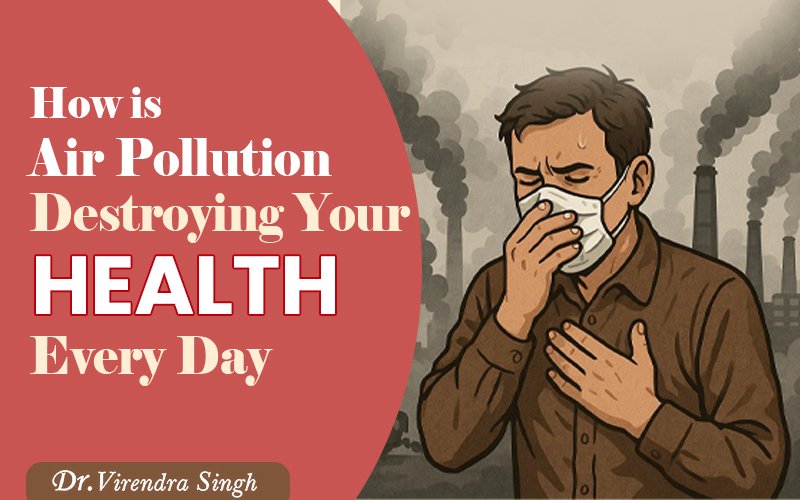
In contrast to nations, states, and regions, air pollution has no set borders. Excessive outdoor air pollution can have serious health consequences for you and your loved ones. Numerous items, including industries, automobiles, and exhaust fumes, can cause dangerous pollutants to be released into the atmosphere, degrading the quality of the air you breathe. These air contaminants have long-term impacts that can harm your body in many ways and expose you to numerous ailments. Asthma, allergies, and certain cancers are the most prevalent health risks. Severe long-term exposures can lower your life expectancy by months to years and can be lethal. The World Health Organisation reports around 3 million deaths per year from outdoor air pollution.
Dr. Virendra Singh, a pulmonologist, provides key insights into how air pollution is silently harming your health every single day. According to him, chronic respiratory disorders like asthma and bronchitis, as well as serious cardiovascular problems, are brought on by extended exposure to polluted air, which is full of tiny particulate matter (PM2.5), poisonous gases like nitrogen dioxide, and other dangerous contaminants. He highlights that children, the elderly, and individuals with pre-existing health conditions are especially vulnerable.
Furthermore, Dr. Virendra Singh cautions that frequent inhalation of even modest amounts of pollution can progressively impair lung function, impair immunity, and raise the risk of heart attacks and strokes. His guide inspires people to use air purifiers indoors, stay informed, wear protective masks in high-pollution areas, and support clean air initiatives for long-term well-being.
How Does Poor Air Quality Make You Sick?
Extended exposure to outdoor air pollution can lead to serious health issues, such as:
- Shortness of breath
- Chest pain
- Heart attacks
- Asthma
- Premature death
- Wheezing
- Bronchitis
- Coughing
Emergency rooms and extended hospital admissions might also result from poor outdoor air quality. Your child may be absent from school or other everyday activities.
How Can You Tell If the Quality of the Air Outside Is Affecting You?
The following are some typical indicators that you are being affected by poor air quality:
- Running Nose
- Burning Eyes
- Troubled Breathing
- Excessive Phlegm
- Worsened Conditions of your Heart and Lungs
- Irritation in your Lungs and Throat
Your vision may even get blurry due to smog from smoke, air pollution, or wildfires. This could increase your likelihood of getting into an accident and put you at serious risk when driving.
How is the Air Quality Measured?
The indicator used to gauge the amount of air pollution in your area is called the air quality index, or AQI. The AQI scale varies between o to 500. The air quality in a location is negatively correlated with its score on this scale. This index is used by the government to educate the people about the air they breathe. The eight major pollutants that the Central Pollution Control Board (CPCB) determined are particulate matter, carbon monoxide, ozone, sulfur dioxide, nitrogen dioxide, ammonia, and lead. The air quality sensors installed in your zones are responsible for detecting these contaminants.
Causes of Air Pollution
There are several underlying causes of air pollution. Here are a few of them.
- Electrical Utilities:- The air you breathe is polluted by your electrical utilities, which include coal, natural gas, oil, and biomass.
- Transportation:- The air quality is impacted by the dangerous pollutants that are released into the atmosphere by your automobiles, buses, motorbikes, trains, and other vehicles.
- Residential Sources:- Fuels like coal and wood are burned in homes, which contributes to air pollution. Air pollutants are also released when lawns are mowed.
- Commercial and Industrial:- Industries or manufacturing facilities can create an environment where people can’t breathe by burning coal excessively and utilizing a lot of heat and power.
Tips for Prevention of Air Pollution
You should be aware of the following forms of air pollution prevention.
- The government publishes air pollution projections every day. Look at the one in your neighborhood. You can tell which areas have poor air quality by looking at the assigned colors forecast.
- When your zone’s air quality declines, limit your outside activities and refrain from exercising outside. Limit the amount of time your child spends outside as well.
- Lower the use of energy at your home. Continuous usage of electricity and other energy sources can contribute to air pollution.
- For short distances, prefer riding a bike or walking. Utilize public transportation to its fullest potential.
- Avoid burning your trash or wood leftovers. These are the main sources of pollutants that might enter your lungs.
- Choose hand-operated or electric lawn care equipment over ones that run on gasoline.
- Disasters are likely to strike you shortly if the air quality falls below usual. Prepare yourself for disasters.
- Verify the purity of the air within your home. To keep the air in your home at a high standard, you can use humidifiers.
- To stop air pollution, there are steps that can be taken or are recommended. Check out campaigns where you can actively participate and provide feedback in order to make your voice heard.
